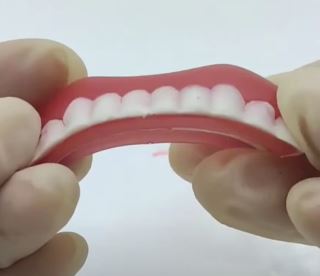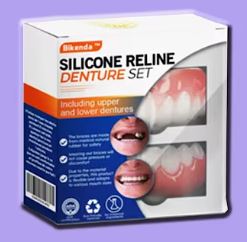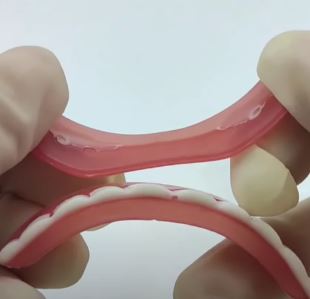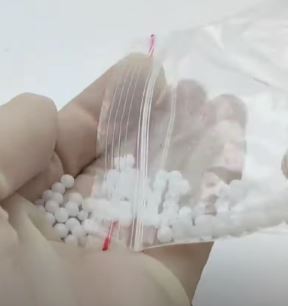Hey there! If you’re tired of loose, uncomfortable dentures rubbing your gums raw, let me tell you about my game-changer: the silicone reline denture set.
I’ve been using one for months, and it’s transformed my daily life—eating, talking, and smiling feel natural again.
In this article, I’ll share my honest experience, break down the pros and cons, offer maintenance tips, and compare top brands like DenSureFit and Perma Soft.
By the end, you’ll see why this affordable, at-home solution is worth a shot for a snug, comfy fit.
My Experience With Silicone Reline Denture Set

Let me paint you a picture: my dentures were slipping, causing sore spots and making every meal a cautious nibble.
I dreaded social events because I was paranoid about my teeth shifting mid-conversation.
Then I stumbled across silicone reline denture sets, specifically DenSureFit, and decided to give it a whirl. Spoiler alert: it was one of the best dental decisions I’ve made.
The process was surprisingly simple. The kit came with clear instructions, a syringe applicator filled with medical-grade silicone, and a few tools like swabs and a primer.
I cleaned my dentures thoroughly, applied the silicone as directed, and pressed them into my mouth to mold the material to my gums.
Within minutes, the silicone set, creating a custom cushion that felt like a hug for my gums.
The first time I ate a crunchy apple without wincing, I was sold.
What stood out was the comfort. Unlike sticky adhesives that I had to reapply daily, this reline stayed put for months.
It’s not perfect—there were hiccups, like learning to apply the right amount of silicone—but the difference in fit and confidence was night and day.
I’ve since tried other brands to see how they stack up, and I’ll dive into those comparisons later.
For now, let’s just say this little kit saved me from countless dentist visits and gave me back my smile.
Pros Of Silicone Reline Denture Set
Also Read: Choose Between Delta Dental And Willamette Dental.

- Enhanced Comfort: The soft silicone feels like a cushion, reducing irritation and sore spots. It molds perfectly to your gums, making dentures feel almost natural. No more wincing while chewing!
- Long-Lasting Fit: Each application lasts up to three months, unlike adhesives that need daily reapplication. This durability means less hassle and more confidence in daily activities.
- No Messy Adhesives: Say goodbye to gooey creams that taste awful and slip mid-day. The silicone creates a suction-like seal, keeping dentures secure without extra products.
- Easy Application: The syringe applicator makes it simple to apply the silicone evenly. Even if you’re not a DIY pro, the instructions are beginner-friendly.
- Cost-Effective: At around $50-$70 per kit, it’s a fraction of a professional reline’s cost (which can run $300+). You get multiple applications in one kit, stretching your dollar further.
- Customizable Fit: You can add layers of silicone to tweak the fit as needed. This flexibility is great for adjusting to changes in your gumline over time.
- Reduces Sore Spots: The silicone redistributes pressure, preventing hot spots where dentures rub. This was a lifesaver for my sensitive gums after extractions.
- Portable Solution: The kit is compact, so you can take it anywhere. If you travel often, it’s easy to pack for on-the-go adjustments.
- No Dentist Visit Required: You can reline at home in under an hour. This convenience saves time and money, especially if dental appointments are hard to schedule.
- Professional-Grade Material: Many kits, like DenSureFit, use the same silicone dentists rely on. You’re getting near-clinical quality without the hefty price tag.
Cons Of Silicone Reline Denture Set

- Learning Curve: Applying the silicone takes practice. My first attempt was uneven, and too much silicone made my dentures feel bulky until I got the hang of it.
- Not for All Dentures: Silicone relines work only on acrylic dentures, not flexible ones like Valplast. Check your denture type before buying to avoid disappointment.
- Temporary Solution: These kits last a few months, but they’re not a permanent fix. You’ll need to reapply or visit a dentist for a long-term solution.
- Potential for Mess: If you twist the syringe cap wrong, the silicone can ooze out, wasting product. I learned this the hard way when I ruined a syringe.
- Removal Can Be Tricky: Peeling off old silicone isn’t always easy. Heating it with a hairdryer helps, but it can still be a fiddly process.
- Initial Cost: While cheaper than a dentist, $50-$70 upfront can feel steep compared to adhesives. It’s an investment that pays off, but it stings at first.
- Not a Cure-All: If your dentures are severely ill-fitting, a reline might not be enough. I had to adjust my expectations for older dentures with significant wear.
- Maintenance Restrictions: You can’t use effervescent cleaners like Polident, as they harden the silicone. This limits your cleaning options and requires extra care.
- Variable Durability: Depending on your habits (like heavy chewing or smoking), the reline may wear out faster than advertised. Mine lasted two months once due to my love for crusty bread.
- Allergy Concerns: Though rare, some users might be sensitive to silicone. Always test a small amount first to avoid irritation.
Maintenance Tips For Silicone Reline Denture Set
- Clean Dentures Thoroughly Before Application: Ensure your dentures are spotless to help the silicone adhere properly. I use a soft toothbrush and mild soap to avoid residue buildup.
- Use a Soft-Bristled Brush: Gently brush the relined dentures with a soft brush under cool water. Harsh scrubbing can damage the silicone’s texture.
- Avoid Effervescent Cleaners: Steer clear of Polident or similar tablets, as they can make the silicone brittle. Stick to gentle, non-abrasive cleaners instead.
- Soak in Cool Water Overnight: When not wearing your dentures, soak them in clean, cool water. This keeps the silicone hydrated and prevents cracking.
- Check Fit Regularly: Every few weeks, assess the fit to catch any loosening early. I mark my calendar to stay on top of this.
- Store Properly: Keep your dentures in a sturdy case to protect the silicone layer. Dropping them can damage the reline, so handle with care.
- Reapply as Needed: If you feel slippage, add a thin layer of silicone. I keep a spare syringe handy for quick touch-ups.
- Avoid Hot Foods Initially: For the first 24 hours after relining, skip hot foods or drinks to let the silicone set fully. I learned this after a coffee mishap softened my reline.
- Consult Your Dentist for Recent Extractions: If your gums are still healing, get your dentist’s okay before using a reline kit. This prevents irritation or improper fit.
- Remove Old Silicone Carefully: When replacing the reline, heat the old layer with a hairdryer to soften it, then peel gently. This avoids damaging your dentures.
Also Read: Choose Between Delta Dental And Willamette Dental.
Comparison With Other Brands

- DenSureFit vs. Perma Soft: DenSureFit uses soft silicone for a cushioned fit, lasting up to three months. Perma Soft offers a semi-soft liner that can last up to two years but requires mixing powder and liquid, which I found messier.
- DenSureFit vs. ProSoft: DenSureFit’s syringe applicator is user-friendly, perfect for beginners. ProSoft is simpler to apply but lasts only six months, and its fit felt less precise for me.
- DenSureFit vs. Cushion Grip: Cushion Grip uses a thermoplastic formula that’s waterproof but harder to remove. DenSureFit’s silicone is softer and easier to peel off when needed.
- DenSureFit vs. Dentemp Reline-It: Dentemp uses a methacrylate-based reliner, which is cheaper but has a chemical taste initially. DenSureFit’s silicone is tasteless and more comfortable.
- DenSureFit vs. DSI Soft Denture Liner: DSI is a professional-grade kit used in clinics, offering durability but requiring precise application. DenSureFit is more accessible for home use.
- DenSureFit vs. GC Reline II: GC Reline II is versatile for various dentures but is designed for dental offices. DenSureFit’s at-home application is more convenient for DIYers like me.
- DenSureFit vs. WholeDent: WholeDent’s kit bonds well but takes longer to set. DenSureFit’s quick-setting silicone saved me time and felt more secure.
- DenSureFit vs. Bikenda: Bikenda’s kit is often mislabeled as veneers, not relines, and has poor reviews for hard materials. DenSureFit’s soft silicone is far superior.
- DenSureFit vs. Furzero: Furzero’s marketing is sketchy, with scam-like claims and no official website. DenSureFit is a trusted brand with reliable results.
- DenSureFit vs. Flex Soft: Flex Soft’s ultra-soft silicone is great for sensitive gums but sets too quickly for adjustments. DenSureFit allows more tweaking for a custom fit.
Frequently Asked Questions (FAQ)
Yes, silicone denture reline kits work wonders for improving fit and comfort. They create a soft, custom cushion that reduces slippage and sore spots. I noticed a huge difference in my dentures’ stability, but results depend on proper application and denture type.
Absolutely, home reline kits like DenSureFit can tighten loose dentures effectively. They’re not as precise as a dentist’s reline but offer a convenient, affordable fix. I’ve used them successfully for months, though they’re best for temporary relief.
Silicone relines typically last 1-3 months per application, depending on your habits and maintenance. Professional relines, like Perma Soft, can last up to two years. My DenSureFit reline lasted about two months with heavy chewing.
rofessional relines cost $300-$500, depending on the dentist and material. Home kits like DenSureFit range from $50-$70, offering multiple applications. I found the DIY option way more budget-friendly for regular upkeep.
Conclusion: For Silicone Reline Denture Set
Also Read: Choose Between Delta Dental And Willamette Dental.
If loose dentures are cramping your style, a silicone reline denture set is a must-try. My experience with DenSureFit showed me how easy and effective these kits can be, saving me from pricey dental visits.
With proper care, you’ll enjoy a snug, comfortable fit that boosts your confidence. Don’t let ill-fitting dentures hold you back—grab a kit, follow the tips I’ve shared, and rediscover the joy of a secure smil
